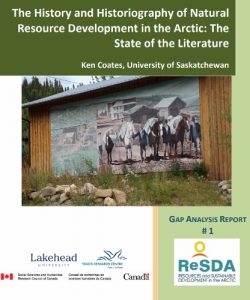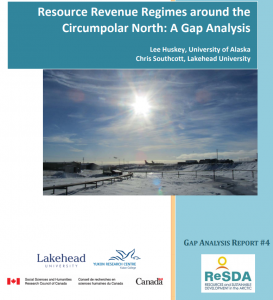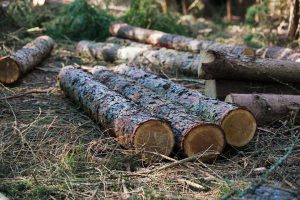CHAPTERS: SEPTEMBER 2018
Coates, K. (2018). The History and Historiography of Natural Resource Development in the Arctic : The State of the Literature. In C. Southcott, F. Abele, D. Natcher, & B. Parlee (Eds.), Resources and Sustainable Development in the Arctic. Routledge.

Abstract
Natural resource development is a prominent and controversial topic in the Far North. While media attention focuses largely on the potential for oil and natural gas discoveries – the extension of the Norway-Russia extraction frontier to North American Arctic waters – the active exploration for and development of mineral deposits has come to feature prominently in the region. For the Governments of Nunavut, Northwest Territories and Yukon, and for the communities across the territorial and provincial Arctic regions, the prospect for economic and social improvements based on cooperative exploitation of natural resources is viewed as an important part of the political puzzle in the North. The recent developments, however, build on a long and complicated history of resource development, albeit one marked more by hope and promise than practical results.
Huskey, L., & Southcott, C. (2018). Resource Revenue Regimes around the Circumpolar North: A Gap Analysis. In F. Abele, D. Natcher, & B. Parlee (Eds.), Resources and Sustainable Development in the Arctic. Routledge.
 Abstract
Abstract
The international press has heralded the new age of arctic resource development. Arctic nations are optimistic about the prospects for resource development in the north. New resource projects are being discussed in areas of current production, like Alaska and Russia, as well as new regions, like Nunavut and Greenland (Rasmussen, 2011).While there are reasons to be cautious about this optimism, changing world demand for resources and changing conditions brought on by climate change may open up the long recognized Arctic resource storehouse. For some regions of the north resource development will introduce a new experience. For regions with a history of development, their experience presents a mixed history of success
Southcott, C. (2018). Resource Development and Climate Change: A Gap Analysis. In F. Abele, D. Natcher, & B. Parlee (Eds.), Resources and Sustainable Development in the Arctic. Routledge.
 Abstract
Abstract
Over the past decade, Arctic resource development is often discussed as being directly related to climate change. In the media and in much of the grey literature, increased resource development in the Arctic is often portrayed as the result of climate change. There seems to be an intuitive recognition that climate change is melting the ice covering the Arctic and, as a result, resources that would have previously been inaccessible are now available for exploitation. An associated belief is that climate change, by melting ice, is making transportation easier and, as such, making it easier to ship technology in and resources out of the region. Yet, despite this seemingly intuitive idea, the limited research that has been done on the subject seems to indicate otherwise. Indeed, climate change may be making resource development more difficult – at least in the immediate term.
Southcott, C., Abele, F., & Natcher, D. (2018). How can extractive industry help rather than hurt Arctic communities? In B. Parlee (Ed.), Resources and Sustainable Development in the Arctic. Routledge.

Abstract
Across Northern Canada, as well as places such as Alaska and Greenland, the political empowerment of Indigenous governments has provided greater control over the conditions of resource development and, in so doing, has enhanced the potential benefits flowing to northern communities. As noted in the introduction, this book is based on a central premise – that the conditions related to extractive resource development in Northern Canada have changed to the point where communities can benefit from resource development without bearing unacceptable social, economic and environmental costs. This is of course not a necessary outcome of any particular resource development, but rather a possibility that can be realized if appropriate regulatory, community and business actions are taken.
